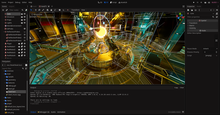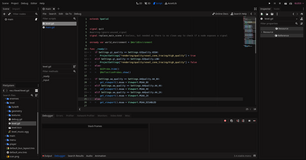Godot (game engine): Difference between revisions
Cross-platform, open-source game engine
 |
|

A screenshot of the editor in Godot 3.4 |
|
| Original author(s) |
|
|---|---|
| Initial release | 14 January 2014[1] |
| Stable release | |
| Repository | |
| Written in | C++[3] |
| Operating system | Microsoft Windows, macOS, Linux, Android, Web, FreeBSD, NetBSD, OpenBSD[4] |
| Platform | See § Supported platforms |
| Size | 28–189.3 Megabytes (varies by operating system)[5] |
| Available in | 36 languages |
|
List of languages Arabic, Argentine Spanish, Brazilian Portuguese, Bulgarian, Catalan, Czech, Dutch, English, Esperanto, Finnish, French, Galician, German, Greek, Hebrew, Hungarian, Indonesian, Italian, Japanese, Korean, Latvian, Malay, Norwegian Bokmål, Polish, Portuguese, Romanian, Russian, Slovak, Simplifield Chinese, Spanish, Swedish, Thai, Traditional Chinese, Turkish, Ukrainian, Vietnamese |
|
| Type | Game engine |
| License | MIT License |
| Website | godotengine |
Godot ([a]) is a cross-platform, free and open-source game engine released under the permissive MIT license. It was initially developed by Argentine software developers Juan Linietsky and Ariel Manzur[6] for several companies in Latin America prior to its public release in 2014.[7] The development environment runs on many platforms, and can export to several more. It is designed to create both 2D and 3D games targeting PC, mobile, and web platforms and can also be used to develop non-game software, including editors.
Features[edit]
Godot allows video game developers to create both 3D and 2D games using multiple programming languages, such as C++, C# and GDScript.[8] It makes use of a hierarchy of nodes to facilitate the development experience.[9] Classes can be derived from a node type to create more specialized node types that inherit behavior. Nodes are organized inside of “scenes”, which are reusable, instanceable, inheritable, and nestable groups of nodes. All game resources, including scripts and graphical assets, are saved as part of the computer’s file system (rather than in a database). This storage solution is intended to facilitate collaboration between game development teams using software version control systems.[10]
Supported platforms[edit]
The engine supports deployment to multiple platforms and allows specification of texture compression and resolution settings for each platform. The website provides binaries only for the editor platforms, and exporting projects to other platforms is done within the Godot editor.
The Godot editor, used for creating Godot games, supports the following platforms:
The engine supports exporting projects to many more platforms, including all of the editor platforms. Currently supported platforms as of Godot 4.0 are:[15]
- Desktop platforms Linux, macOS, Windows, BSD (must be compiled manually[14])
- Mobile platforms Android, iOS
- Web platform HTML5, WebAssembly.[16]
- Virtual/extended reality platforms HTC Vive, Valve Index, Oculus Rift, Oculus Go, Oculus Quest, all Microsoft MR headsets, Apple’s ARKit and many more.[4]
The Godot engine can be run on consoles, although popular consoles are not officially supported since they do not allow their platform-specific code to be published under an open-source license.[17] Games can be ported to consoles through third-party companies.[18][19] Godot 4 support for consoles by third party teams is currently being worked on.[15] W4 Games, a commercial company co-founded by some members of Godot’s leadership, has announced plans to offer services porting Godot 4.0 games to Microsoft, Nintendo, and Sony platforms.[20][21]
For CPU architectures, Godot officially supports x86 on all desktop platforms (both 32-bit and 64-bit where available) and has official ARM support on macOS, mobile platforms, and standalone Oculus platforms (both 32-bit and 64-bit where available). The web platform uses 32-bit WebAssembly. Support for ARM, RISC-V, and PowerPC Linux is unofficial and experimental.[22][23]
Scripting[edit]

Godot supports a variety of programming languages for making games, including the integrated language GDScript, C++[24] and C#. Additionally, the engine includes GDNative, a facility for creating bindings with other languages. Officially-supported GDNative languages include C and C++.[25] Community-supported languages include Rust, Nim, Haskell, Clojure, Swift, and D.[26] Visual coding was also supported, via the built-in language VisualScript, designed to be a visual equivalent to GDScript.[19] Visual Scripting was removed from the core engine in Godot 4.0.[27] Godot games running in the browser can interface with the browser’s JavaScript code.
The Godot editor includes a text editor with auto indentation, syntax highlighting and code completion and folding. It also features a debugger with the ability to set breakpoints and program stepping.[28]
GDScript[edit]
Godot has its own…
Read More: Godot (game engine): Difference between revisions

